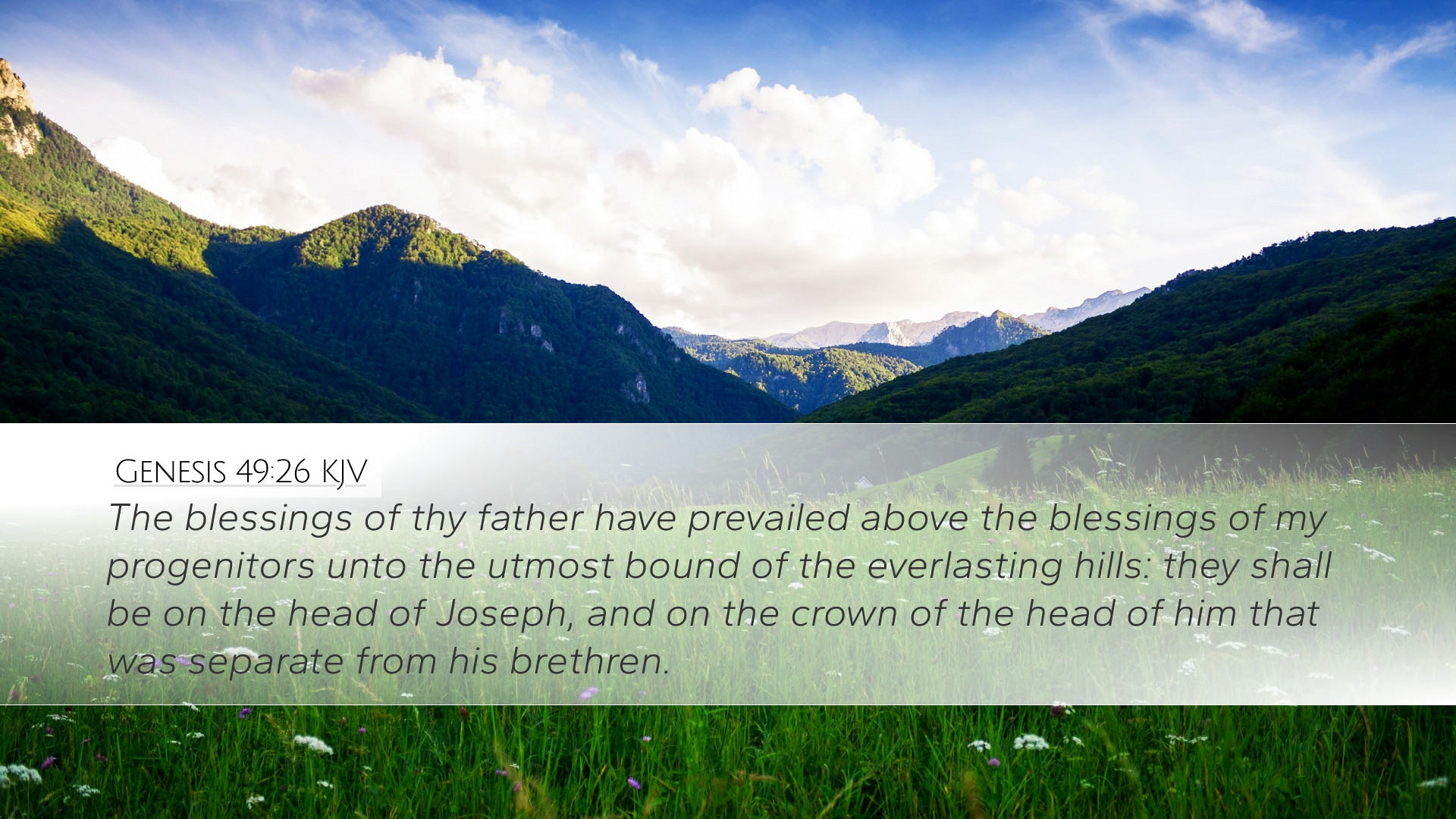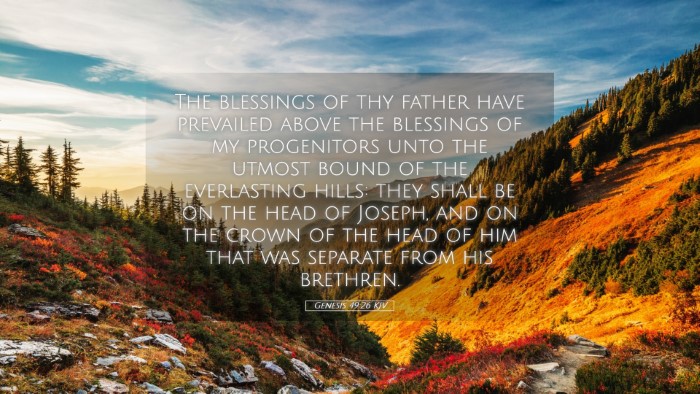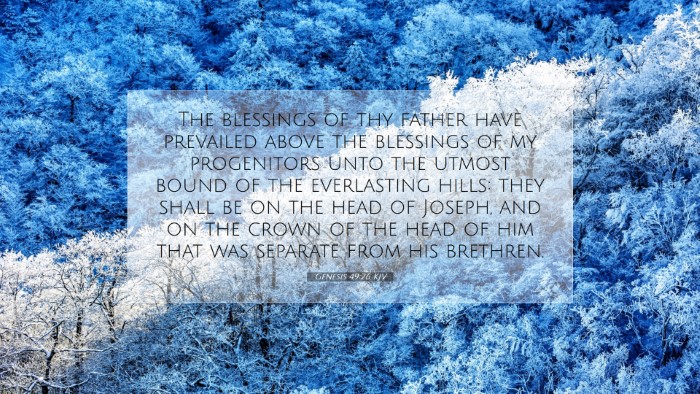Commentary on Genesis 49:26
Verse Reference: Genesis 49:26 - "The blessings of your father have prevailed above the blessings of my progenitors unto the utmost bound of the everlasting hills: they shall be on the head of Joseph, and on the crown of the head of him that was separated from his brethren."
Introduction
The 49th chapter of Genesis presents the prophetic blessings given by Jacob to his twelve sons. In verse 26, Jacob's blessing over Joseph stands out for its richness and prophetic significance. This verse encapsulates the divine favor bestowed upon Joseph and illustrates the overarching theme of God's sovereignty in fulfilling His promises through generations.
Insights from Public Domain Commentaries
Matthew Henry's Commentary
Matthew Henry emphasizes that Jacob's blessings are not merely familial sentiments but are imbued with prophetic insights. He notes that Joseph's blessing “prevails” above those of Jacob's fathers, indicating a divine hierarchy of favor. Henry expounds upon Joseph's life, highlighting his trials and rise to power as a demonstration of God's providence.
Henry particularly focuses on the phrase “the utmost bound of the everlasting hills”, suggesting a permanence and stability in Joseph's blessings. This term signifies not just geographical landmarks but also spiritual milestones whereby Joseph’s lineage would be fruitful and enduring. The “everlasting hills” can be interpreted as symbolic of unchanging covenants made by God to His people, manifesting in Joseph’s descendants.
Albert Barnes' Notes
Albert Barnes provides a detailed analysis of the text's structure and its implications. He asserts that Jacob's blessing indicates a superiority in Joseph's future prospects compared to his brothers. Barnes discusses the phrase, “on the head of Joseph,” highlighting its idiomatic use in Hebrew literature, which points to a position of honor and leadership. The phrase underscores Joseph’s distinct role in the unfolding narrative of Israel's history.
Furthermore, Barnes notes the duality of God's promises—while Joseph was “separated from his brethren,” a designation that reflects both his physical detachment and spiritual elevation as a leader. This situation serves as an allegory for the relationship between Israel and God's chosen people, illustrating that separation can sometimes be an avenue to divine elevation.
Adam Clarke's Commentary
Adam Clarke offers a nuanced interpretation concerning the familial dynamics represented in this verse. He discusses the metaphorical implications of the blessings being “on the crown of the head”, linking it to honors and responsibilities that come with leadership. Clarke points out that this signifies Joseph's elevation not just in status but also in the burdens of leadership which he would carry during the famine and times of crisis.
Clarke expands this view by exploring the theological implications—he suggests that the blessings given to Joseph transcend mere personal gain. They echo God's covenant with Abraham, emphasizing that Joseph's successes contribute to the fulfillment of a larger divine plan. The blessings serve a dual purpose: personal as well as communal, providing sustenance and deliverance to the broader family of Israel during dire times.
Key Themes
- Divine Favor and Sovereignty: This verse vividly illustrates the theme of God's favor in choosing Joseph, despite his previous tribulations. Jacob's blessing is a testament to God's overarching sovereignty.
- Symbolism of Leadership: The imagery of the "crown" denotes not only Joseph's position but also the weight of leadership and responsibility that accompanies such a role.
- Generational Promises: Joseph's blessing reflects a continuity of God's promises to Abraham, Isaac, and Jacob. It invites contemplation on how blessings can amplify across generations.
- Separation and Distinction: The mention of Joseph being “separated from his brethren” serves as a poignant reminder that divine purposes may lead to isolation but ultimately result in restoration and elevation.
Theological Implications
Genesis 49:26 serves as a powerful scripture for theologians and pastors, affirming that God's plan often transcends human understanding. The blessings of Joseph underscore the nuanced relationship between divine favor and human struggles. This verse invites believers to reflect on their own journeys, recognizing that moments of separation or trial can be preparatory steps toward greater purposes.
Moreover, scholars can utilize this blessed assurance in teaching congregations about the faithfulness of God. In times of uncertainty, the eternal nature of God’s blessings, as symbolized by “everlasting hills,” serves to anchor hope in believers.
Conclusion
The blessing bestowed upon Joseph in Genesis 49:26 resonates with timeless relevance, encapsulating God's providence, the honor of leadership, and the intricate tapestry of familial and divine relationships. Commentators like Matthew Henry, Albert Barnes, and Adam Clarke offer profound insights that enrich our understanding of this pivotal verse. As we delve deeper into this scripture, we are reminded of the overarching narrative of grace and sovereignty that defines the Biblical story of redemption.


